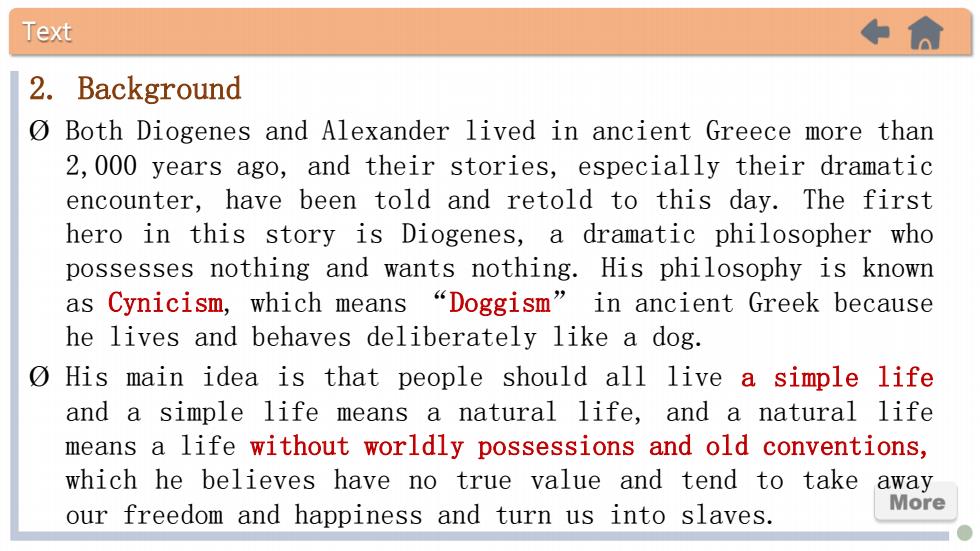
+食Text2.BackgroundO Both Diogenes and Alexander lived in ancient Greece more than2,ooo years ago, and their stories, especially their dramaticencounter,have been told and retold to this day.The firsthero in this story is Diogenes, a dramatic philosopher whopossesses nothing and wants nothing.His philosophy is knownCynicism, which means“Doggism”in ancient Greek becauseas(he lives and behaves deliberately like a dog.O His main idea is that people should all live a simple lifeand a simple life means a naturallife, and a naturallifemeans a life without worldly possessions and old conventions,which he believes have no true value and tend to take awayMoreour freedom and happiness and turn us into slaves
Text 2. Background Ø Both Diogenes and Alexander lived in ancient Greece more than 2,000 years ago, and their stories, especially their dramatic encounter, have been told and retold to this day. The first hero in this story is Diogenes, a dramatic philosopher who possesses nothing and wants nothing. His philosophy is known as Cynicism, which means “Doggism” in ancient Greek because he lives and behaves deliberately like a dog. Ø His main idea is that people should all live a simple life and a simple life means a natural life, and a natural life means a life without worldly possessions and old conventions, which he believes have no true value and tend to take away our freedom and happiness and turn us into slaves
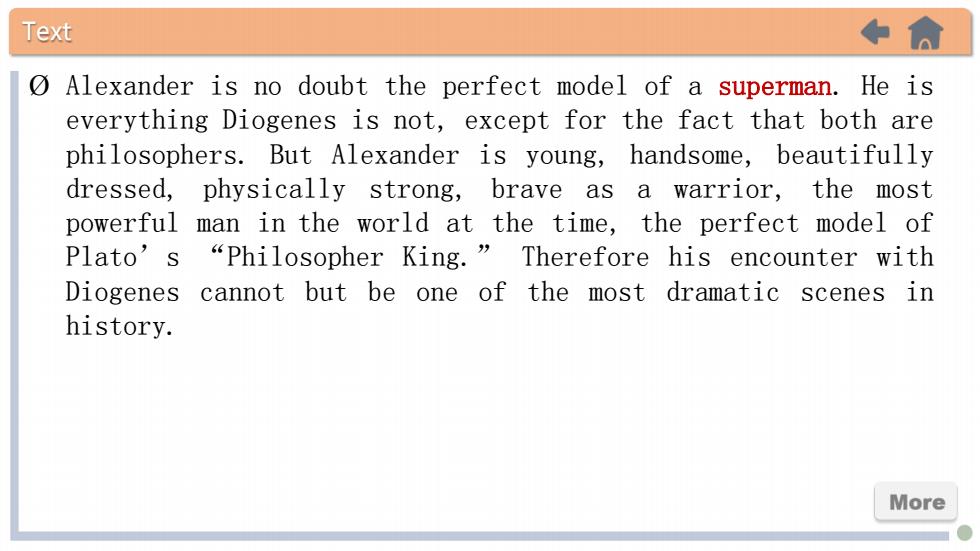
Text+食O Alexander is no doubt the perfect model of a superman. He iseverything Diogenes is not, except for the fact that both arephilosophers.But Alexanderis young, handsome,beautifullydressed, physically strong, brave as a warrior, the mostpowerful man in the world at the time, the perfect model ofPlato' s“Philosopher King.”Therefore his encounter withDiogenes cannot but be one of the most dramatic scenes inhistory.More
Text Ø Alexander is no doubt the perfect model of a superman. He is everything Diogenes is not, except for the fact that both are philosophers. But Alexander is young, handsome, beautifully dressed, physically strong, brave as a warrior, the most powerful man in the world at the time, the perfect model of Plato’s “Philosopher King.” Therefore his encounter with Diogenes cannot but be one of the most dramatic scenes in history
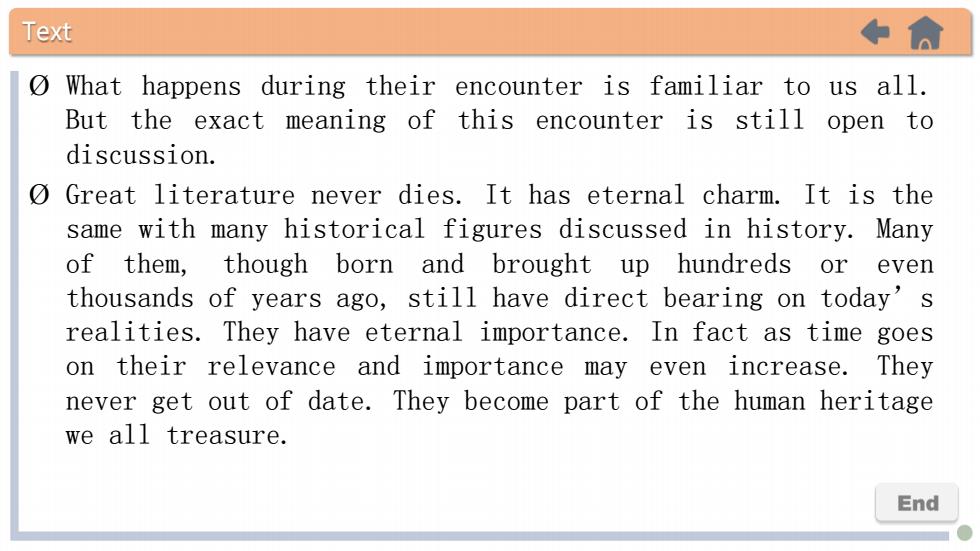
Text食O What happens during their encounter is familiar to us all.But the exact meaning of this encounter is still open todiscussion.O Great literature never dies. It has eternal charm. It is thesame with many historical figures discussed in history. Manyof them,though born and brought up hundreds or eventhousands of years ago, still have direct bearing on today' srealities. They have eternal importance. In fact as time goeson their relevance and importance may even increase. Theynever get out of date. They become part of the human heritagewe all treasure.End
Ø What happens during their encounter is familiar to us all. But the exact meaning of this encounter is still open to discussion. Ø Great literature never dies. It has eternal charm. It is the same with many historical figures discussed in history. Many of them, though born and brought up hundreds or even thousands of years ago, still have direct bearing on today’s realities. They have eternal importance. In fact as time goes on their relevance and importance may even increase. They never get out of date. They become part of the human heritage we all treasure. Text
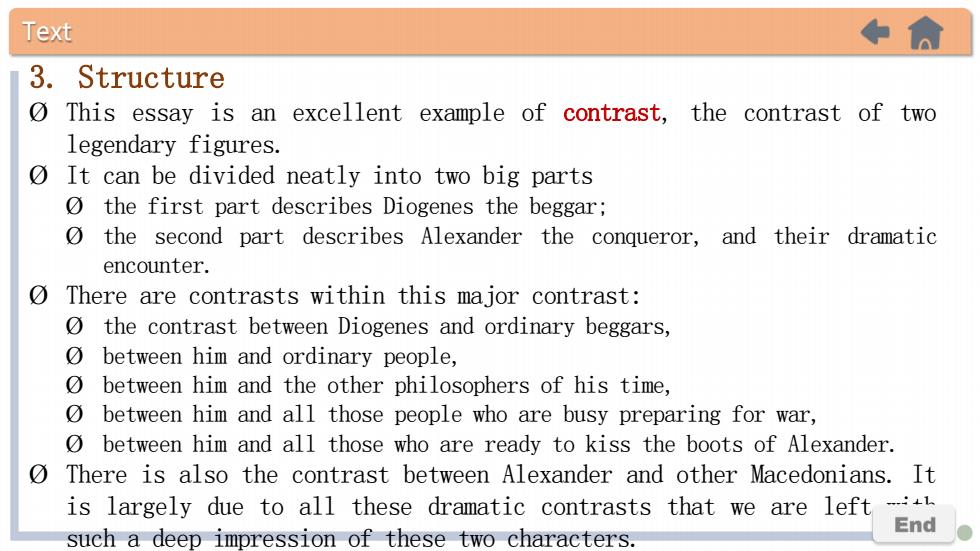
Text全合3.StructureO This essay is an excellent example of contrast,the contrast of twolegendary figures.0It can be divided neatly into two big partsO the first part describes Diogenes the beggar;Othe second part describes Alexander the conqueror,and their dramaticencounter.0There are contrasts within this major contrast:0the contrast between Diogenes and ordinary beggars,0betweenhimandordinarypeople,0between him and the other philosophers of his time,0betweenhim and all thosepeoplewho are busypreparing for war,betweenhim andall thosewhoare ready tokissthe bootsof Alexander.There is also the contrast between Alexander and other Macedonians. Itis largely due to all these dramatic contrasts that we are left -i+Endsuich a deen imnression of these two characters
3. Structure Ø This essay is an excellent example of contrast, the contrast of two legendary figures. Ø It can be divided neatly into two big parts Ø the first part describes Diogenes the beggar; Ø the second part describes Alexander the conqueror, and their dramatic encounter. Ø There are contrasts within this major contrast: Ø the contrast between Diogenes and ordinary beggars, Ø between him and ordinary people, Ø between him and the other philosophers of his time, Ø between him and all those people who are busy preparing for war, Ø between him and all those who are ready to kiss the boots of Alexander. Ø There is also the contrast between Alexander and other Macedonians. It is largely due to all these dramatic contrasts that we are left with such a deep impression of these two characters. Text
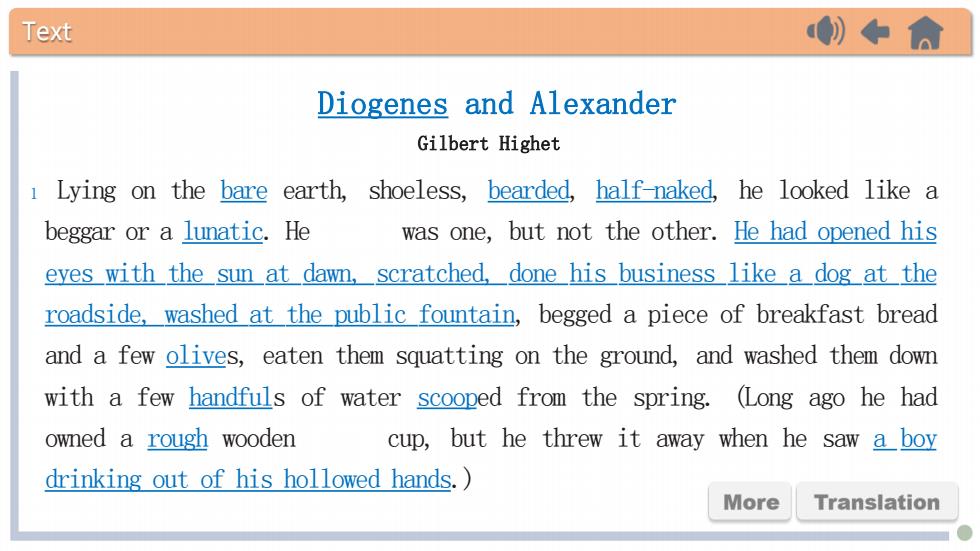
Text食Diogenes and AlexanderGilbert Highet1 Lying on the bare earth, shoeless, bearded, half-naked, he looked like abeggar oralunatic.Hewas one, but not the other.He had opened hiseyes with the sun at dawn, scratched done his business like a dog _at theroadside, washed at the public fountain, begged a piece of breakfast breadand a few olives, eaten them squatting on the ground, and washed them downwith a few handfuls of water scooped from the spring.(Long ago he hadowned a rough woodencup,but hethrew it awaywhen hesawaboydrinking out of his hollowed hands.)MoreTranslation
Diogenes and Alexander Gilbert Highet 1 Lying on the bare earth, shoeless, bearded, half-naked, he looked like a beggar or a lunatic. He was one, but not the other. He had opened his eyes with the sun at dawn, scratched, done his business like a dog at the roadside, washed at the public fountain, begged a piece of breakfast bread and a few olives, eaten them squatting on the ground, and washed them down with a few handfuls of water scooped from the spring. (Long ago he had owned a rough wooden cup, but he threw it away when he saw a boy drinking out of his hollowed hands.) Text